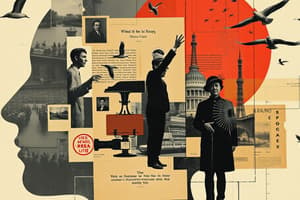Podcast
Questions and Answers
What is Susan's behavior regarding Apple products an example of?
What is Susan's behavior regarding Apple products an example of?
Instrumental function
Define a total institution.
Define a total institution.
An organization in which participants live a controlled lifestyle and in which total resocialization occurs.
Michael's basketball team is serving as his _____ when he looks to them for behavioral cues.
Michael's basketball team is serving as his _____ when he looks to them for behavioral cues.
reference group
What conclusion did Solomon Asch reach about conformity?
What conclusion did Solomon Asch reach about conformity?
What is Sandy a part of when standing in line for Kanye West tickets?
What is Sandy a part of when standing in line for Kanye West tickets?
What is an instrumental leader primarily concerned with?
What is an instrumental leader primarily concerned with?
Which is NOT a characteristic of a bureaucracy?
Which is NOT a characteristic of a bureaucracy?
Define reference groups.
Define reference groups.
Justin is about to become a member of a __________.
Justin is about to become a member of a __________.
Christine is a(n) _____ leader.
Christine is a(n) _____ leader.
Durkheim defined ______ as the communal beliefs, morals, and attitudes of a society.
Durkheim defined ______ as the communal beliefs, morals, and attitudes of a society.
What tension did Karl Marx assert exists for societal change?
What tension did Karl Marx assert exists for societal change?
______ describes how any action that is repeated frequently becomes cast into a pattern.
______ describes how any action that is repeated frequently becomes cast into a pattern.
Define anomie.
Define anomie.
As industrialization began to boom, why did Durkheim believe people were more susceptible to anomie?
As industrialization began to boom, why did Durkheim believe people were more susceptible to anomie?
What does Charles Cooley's concept of the looking-glass self hypothesize?
What does Charles Cooley's concept of the looking-glass self hypothesize?
____ societies relied on permanent tools for survival.
____ societies relied on permanent tools for survival.
What is alienation defined as?
What is alienation defined as?
Please place the following societies in chronological order:
Please place the following societies in chronological order:
What would a symbolic interactionist be most concerned with?
What would a symbolic interactionist be most concerned with?
Flashcards are hidden until you start studying
Study Notes
Instrumental Function
- Instrumental function refers to an individual's engaging behavior driven by the pursuit of goals, such as Susan's devotion to owning the latest Apple products.
Total Institution
- Defined as organizations where participants live a controlled lifestyle, undergoing total resocialization, like prisons or military establishments.
Reference Group
- A reference group serves as a social benchmark for individuals, influencing their behavior and attitudes, exemplified by Michael looking to his basketball teammates.
Conformity and Group Influence
- Solomon Asch's study highlights that individuals may conform due to the perception that the group possesses greater knowledge.
Aggregate
- An aggregate is a collection of individuals who are in proximity to each other but do not share a common identity, as seen with Sandy waiting for concert tickets.
Instrumental Leader
- An instrumental leader focuses on achieving specific tasks and guiding a group toward accomplishing defined goals.
Bureaucracy Characteristics
- Bureaucracies typically lack personality-based promotions, relying instead on established rules and performances.
Concept of Reference Groups
- Reference groups are essential for self-assessment, enabling individuals to compare their beliefs and behaviors with others.
Utilitarian Organization
- Utilitarian organizations provide tangible rewards for members, such as employment institutions or educational facilities, exemplified by Justin’s community college enrollment.
Laissez-faire Leader
- A laissez-faire leader adopts a hands-off approach, allowing group members autonomy in decision-making, as seen with Christine in her comedy troupe.
Collective Conscience
- Defined by Durkheim as the shared beliefs, morals, and values that bind a society together.
Societal Change and Conflict
- Karl Marx posited that societal change stems from the conflict between the proletariat (working class) and the bourgeois (wealthy class) over the means of production.
Habitualization
- Habitualization refers to the process by which repeated actions become established as patterns of behavior over time.
Anomie
- Anomie is characterized by a lack of collective consciousness, leading to societal disconnection and instability.
Factors Contributing to Anomie
- Durkheim identified multiple factors contributing to anomie during industrialization, including weakened collective norms, loss of collective support, and role alienation due to labor specialization.
Looking-glass Self
- Charles Cooley's looking-glass self concept suggests that individuals form self-images based on how they believe they are perceived by others.
Agricultural Societies
- Agricultural societies utilize permanent tools for survival, benefiting from innovations such as crop rotation and fertilizers for increased productivity.
Alienation
- Alienation describes feelings of isolation experienced by individuals who feel detached from society, their work, or their self-identity.
Chronological Order of Societies
- Societal types follow this order: hunter-gatherer, pastoral, horticultural, and agricultural.
Symbolic Interactionism
- Symbolic interactionist perspectives focus on how individuals use objects and their symbols in managing impressions within social interactions.
Studying That Suits You
Use AI to generate personalized quizzes and flashcards to suit your learning preferences.




